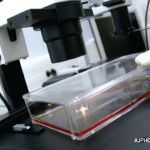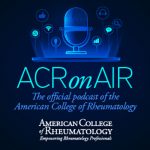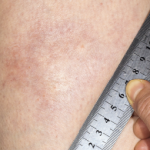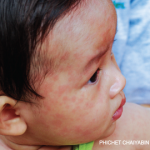Rheumatology professional and patients visited with 117 legislators and their staffs during the 2019 Advocates for Arthritis event to champion better rheumatology patient care and access.


Rheumatology professional and patients visited with 117 legislators and their staffs during the 2019 Advocates for Arthritis event to champion better rheumatology patient care and access.
In a national survey of more than 1,500 Americans with rheumatic disease, more than half reported struggling to access affordable care and nearly two-thirds described challenges performing simple daily tasks.

An experienced mentor shares his tips for how to support rheumatology professionals who are learning the art of rheumatologic care early in their careers…

When evaluating patients with possible myopathic symptoms, rheumatologists must consider a rare, but important, group of inherited disorders: the metabolic myopathies. However, their diagnosis often remains a challenge. Early recognition of these primary metabolic myopathies is essential to help prevent disease morbidity and mortality from rhabdomyolysis. Here, we focus on the metabolic myopathies that present…

A new podcast from the ACR provides in-depth discussions about newly published science, regulatory updates, advocacy and volunteer opportunities for the rheumatology community…

Medical students and residents are choosing careers in rheumatology, thanks in part to the annual Choose Rheumatology Experience hosted by the Rheumatology Research Foundation during the ACR/ARP Annual Meeting. The Choose Rheumatology Experience is a special half-day program designed to help future physicians and rheumatology professionals navigate the Annual Meeting. Cultivating interest in rheumatology is…

In September 2018, the U.S. Food & Drug Administration (FDA) granted fast-track status to FCX‑013, a gene therapy product developed to treat moderate to severe localized scleroderma (morphea). Previously, the treatment received an orphan drug designation for localized scleroderma, as well as a rare pediatric disease designation. Phase 1 and 2 studies will assess safety…

Courtney B. Crayne, MD, & Amanda Schnell, MD |
“Congratulations! You have matched!” With Match Day in the rearview mirror and residency nearing an end, incoming fellows prepare for the next road trip on their journey to becoming a rheumatologist. Residency molds new graduates into competent physicians by providing an overview of general medicine and teaching them the clinical and professional skills necessary to…

Congratulations! You’ve decided to become a rheumatologist and, in so doing, join the ranks of some of the most intelligent, empathic and dynamic physicians out there. But between your decision today and where you see yourself in three, five or 10 years, many more decisions must be made. Arguably, the most important is the decision…

Despite the presence of a highly effective vaccine, measles (rubeola) is still an important problem worldwide, one that has reemerged in some areas of the world where it had previously been almost eradicated. Rheumatology patients may have questions about whether they are sufficiently protected. Here we discuss key considerations for rheumatologists in light of recent…